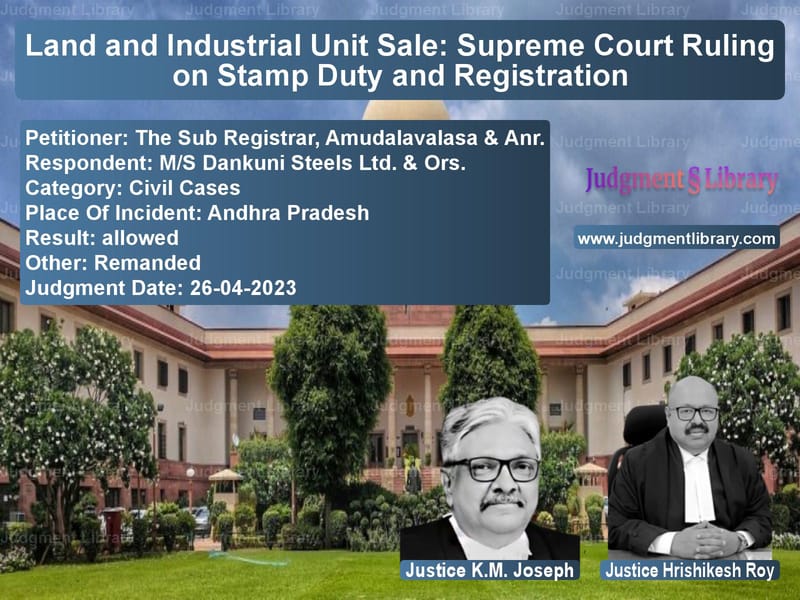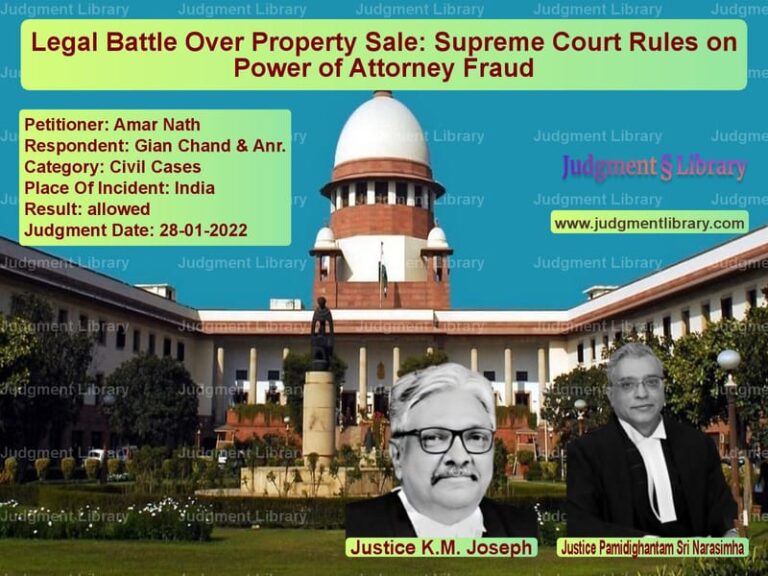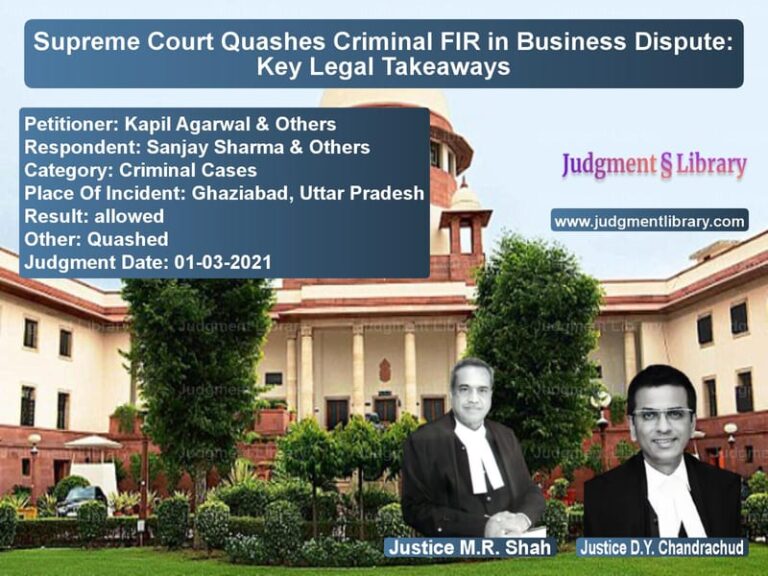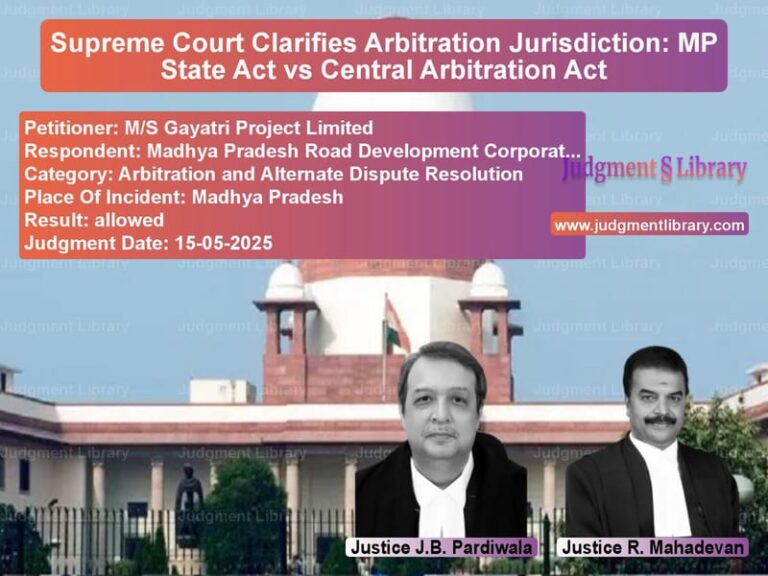Land and Industrial Unit Sale: Supreme Court Ruling on Stamp Duty and Registration
The case of The Sub Registrar, Amudalavalasa & Anr. v. M/S Dankuni Steels Ltd. & Ors. involved a legal dispute over the valuation and registration of a sale deed for an industrial unit. The Supreme Court ruled on the applicability of stamp duty and whether an auctioned property, including land, buildings, plant, and machinery, should be registered as a single unit or separate assets.
Background of the Case
The dispute arose from the sale of the assets of M/s. Midwest Iron & Steel Company Ltd., which was ordered to be wound up by the Andhra Pradesh High Court in 2002. Following unsuccessful attempts to sell the property in three separate lots, the court approved a consolidated sale. M/s. SMC Marketing Private Ltd. emerged as the highest bidder, purchasing the entire industrial unit for Rs. 8.35 crores. The sale deed was executed in favor of M/s. Dankuni Steels Ltd.
However, a dispute arose when the Sub-Registrar of Amudalavalasa refused to register the sale deed for Rs. 1,01,05,000 as claimed by the buyer, arguing that the transaction covered land, buildings, plant, and machinery valued at Rs. 8.35 crores.
Petitioner’s Arguments
The learned counsel for the petitioners, representing the government, contended:
- The sale involved all assets of the company, including immovable assets such as plant and machinery, and should be valued as a whole.
- The Sub-Registrar had the right to assess whether the stamp duty was accurately calculated based on the market value of the entire transaction.
- The Andhra Pradesh Stamp Act empowered the registration authorities to determine the proper valuation of the property for stamp duty purposes.
- The buyers were attempting to understate the value of the assets to reduce stamp duty liability.
Respondent’s Arguments
The buyers, represented by their counsel, argued:
- The registration was sought only for the land and buildings, excluding plant and machinery, and they should not be compelled to pay duty on assets not part of the registered document.
- They relied on an exemption under G.O.Ms.No.103, which provided for a 50% reduction in stamp duty for industrial units.
- The Sub-Registrar was overstepping its jurisdiction by assessing assets beyond those specified in the sale deed.
Key Legal Issues
The Supreme Court examined the following critical questions:
- Whether an auctioned industrial unit, including land, buildings, and machinery, should be treated as a single transaction for stamp duty purposes.
- Can the registration authorities assess the full value of the transaction, including embedded plant and machinery, even if the sale deed attempts to exclude them?
- Does the government order granting stamp duty exemptions apply to this transaction?
Supreme Court’s Observations
The Supreme Court ruled in favor of the petitioners, emphasizing:
- “The sale deed, though structured to appear as a transfer of land and buildings alone, in substance, includes the plant and machinery, which are permanently embedded in the industrial unit.”
- “Stamp duty must be assessed based on the full value of the assets sold, not merely on the portion arbitrarily declared in the sale deed.”
- “The registration authorities have the legal authority to scrutinize transactions and ensure proper duty payment.”
- “Exemptions under G.O.Ms.No.103 apply only to eligible industrial units, and the benefits cannot be claimed as a matter of right.”
Precedents and Legal Analysis
The judgment relied on past rulings:
- Duncans Industries Ltd. v. State of Uttar Pradesh – Held that permanently embedded machinery forms part of immovable property.
- Member, Board of Revenue v. Arthur Paul Benthall – Explained how multiple components in a single transaction should be assessed for stamp duty.
- Chief Controlling Revenue Authority v. Coastal Gujarat Power Ltd. – Confirmed the right of registration authorities to scrutinize transactions.
Final Ruling
The Supreme Court ruled that:
- The sale deed covered land, buildings, and permanently affixed machinery, making the entire transaction subject to full stamp duty.
- The buyers could not exclude plant and machinery from valuation simply by limiting the description in the sale deed.
- The matter was remanded to the registration authorities to reassess the stamp duty and determine whether the industrial unit qualified for exemptions under G.O.Ms.No.103.
Conclusion
This ruling reinforces the principle that stamp duty must reflect the actual value of a transaction. It prevents parties from structuring agreements to evade taxes and ensures fair revenue collection. The decision also clarifies that industrial exemptions must be carefully applied, preventing misuse of government benefits.
Petitioner Name: The Sub Registrar, Amudalavalasa & Anr..Respondent Name: M/S Dankuni Steels Ltd. & Ors..Judgment By: Justice K.M. Joseph, Justice Hrishikesh Roy.Place Of Incident: Andhra Pradesh.Judgment Date: 26-04-2023.
Don’t miss out on the full details! Download the complete judgment in PDF format below and gain valuable insights instantly!
Download Judgment: the-sub-registrar,-a-vs-ms-dankuni-steels-l-supreme-court-of-india-judgment-dated-26-04-2023.pdf
Directly Download Judgment: Directly download this Judgment
See all petitions in Property Disputes
See all petitions in Contract Disputes
See all petitions in Damages and Compensation
See all petitions in Judgment by K.M. Joseph
See all petitions in Judgment by Hrishikesh Roy
See all petitions in allowed
See all petitions in Remanded
See all petitions in supreme court of India judgments April 2023
See all petitions in 2023 judgments
See all posts in Civil Cases Category
See all allowed petitions in Civil Cases Category
See all Dismissed petitions in Civil Cases Category
See all partially allowed petitions in Civil Cases Category







